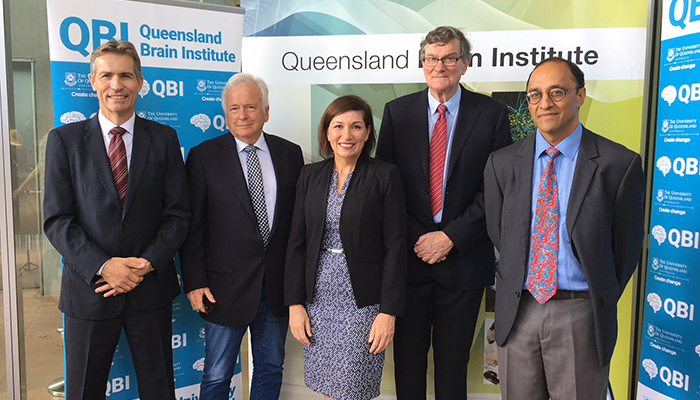
A potential drug to treat motor neurone disease (MND) is set to emerge from a partnership between The University of Queensland and the Queensland Government.
The Queensland Brain Institute (QBI) is working with a Queensland company, NuNerve, to develop and manufacture the drug candidate for use in clinical trials in 2019.
MND, also known as amyotrophic lateral sclerosis (ALS) or Lou Gehrig’s disease, is a rapidly progressing neurological disorder that attacks the nerve cells in the brain and spinal cord that control speech, movement, eating and breathing. The loss of these nerve cells (motor neurons) leads to progressive muscle weakness and wasting, and death. There is currently no cure.
Queensland Science Minister Leeanne Enoch said the work provided real hope for people with the devastating disease, and demonstrated the benefits of investing in science infrastructure.
“In 2005, the Queensland Government partnered with UQ to establish the Queensland Brain Institute, now one of the world’s major medical research institutes,” Ms Enoch said.
“The government and university agreed that Queensland would receive a return on investment from any new therapeutic drugs that were developed by the Institute.
“Queensland will receive its first commercial return from the Queensland Brain Institute from the development of this new MND drug candidate.
“This bodes well for future translational opportunities for Queensland science, and highlights the long-term nature of these investments in science infrastructure.”
Drug manufacture hub in Queensland
In 2005 the Government also committed to establishing a biologics manufacturing facility in Woolloongabba.
Patheon, part of Thermo Fisher Scientific, operates the facility and has been contracted by NuNerve for the project.
The MND drug candidate will be the first Queensland-based drug development program involving Brisbane-based Patheon facility.
“The establishment of this biologics manufacturing facility shows remarkable insight and underlines how key government investment pays significant dividends for the state,” Ms Enoch said.
MND drug candidate an exciting development
The drug candidate blocks a protein known as EphA4, the subject of more than two decades of research by QBI’s Professor Perry Bartlett with Emeritus Professor Andrew Boyd from UQ and QIMR Berghofer.
UQ Vice-Chancellor and President Professor Peter Høj said the discovery opened the way for this exciting development.
“The research showed that EphA4 was the key molecule involved in the guidance of motor neurons from the brain to targets in the spinal cord and was also responsible for impeding the recovery of motor neurons following injury.”
Professor Bartlett said the researchers believed the finding would have important implications for the future treatment of MND, spinal cord injury, as well as other neurological diseases.
“It is gratifying to see our discovery translated into a potential treatment for patients with MND.”
NuNerve has licensed the intellectual property from UniQuest, UQ’s commercialisation company, as part of its focus on new technologies to treat or prevent the neurological disease that progressively attacks nerve cells in the brain and spinal cord.
The project is supported by Peter Goodenough Corpus, Spinal Cure Australia (estate of Lisa Palmer), the BioPharmaceuticals Australia Development Fund, and FightMND.



